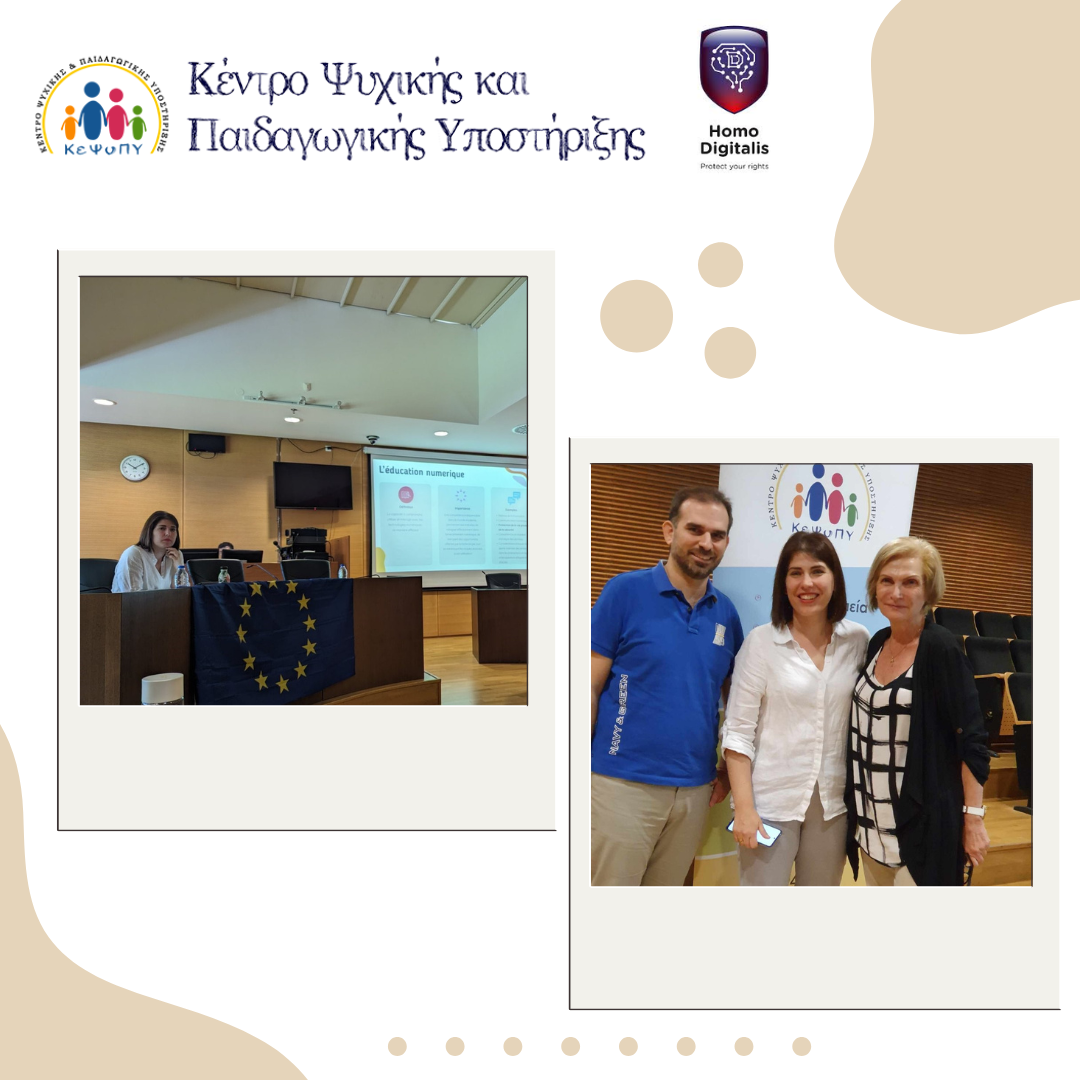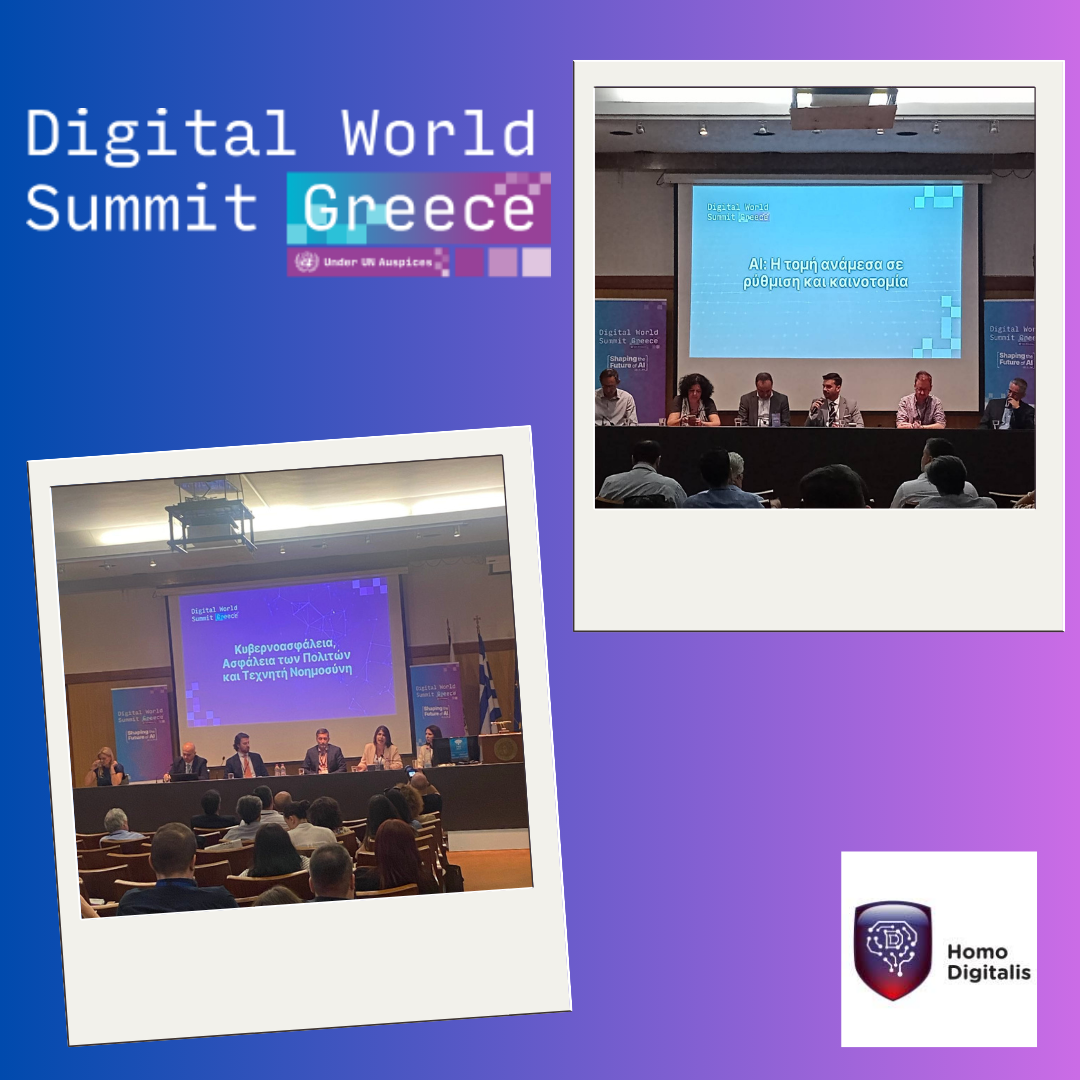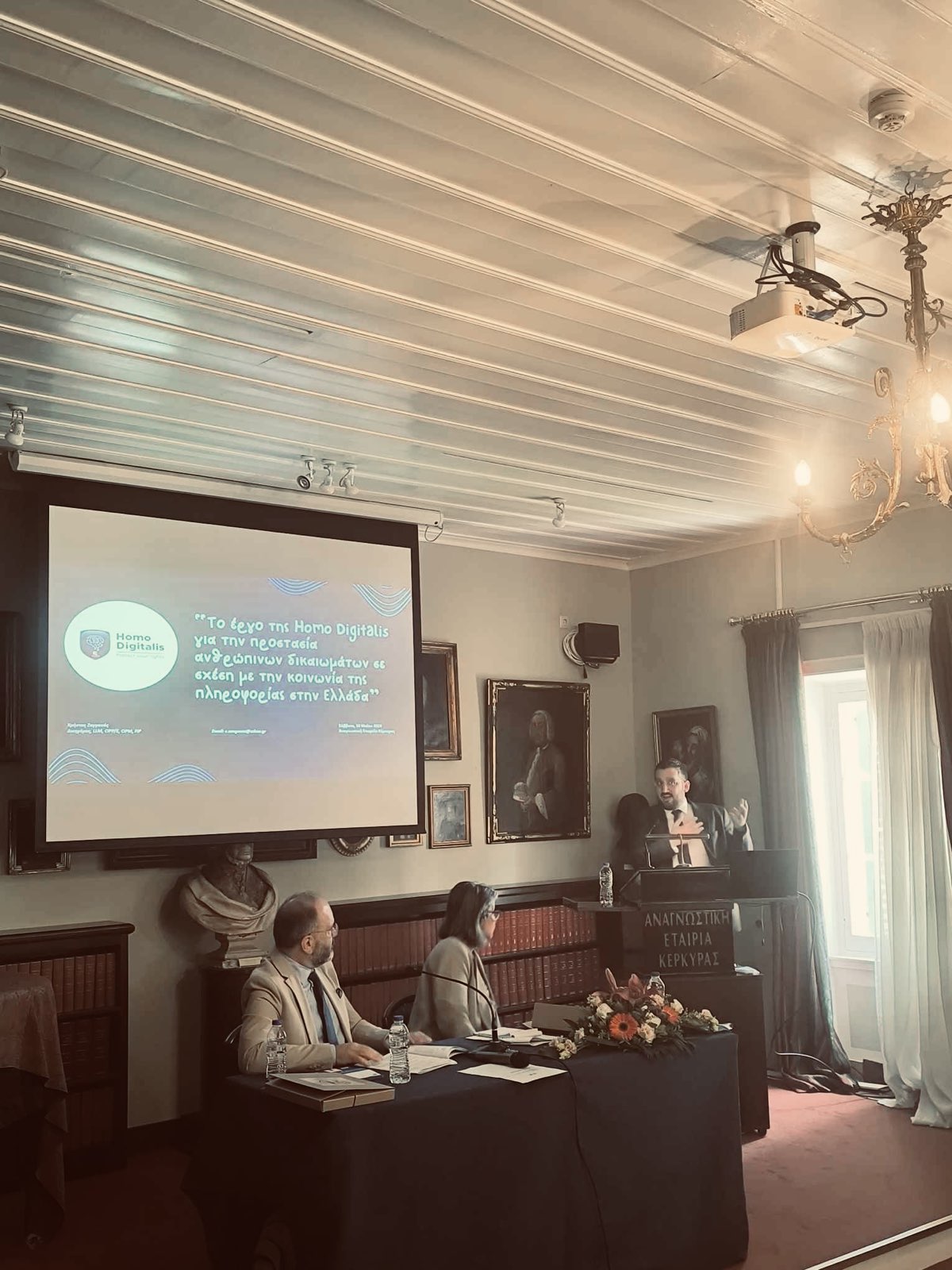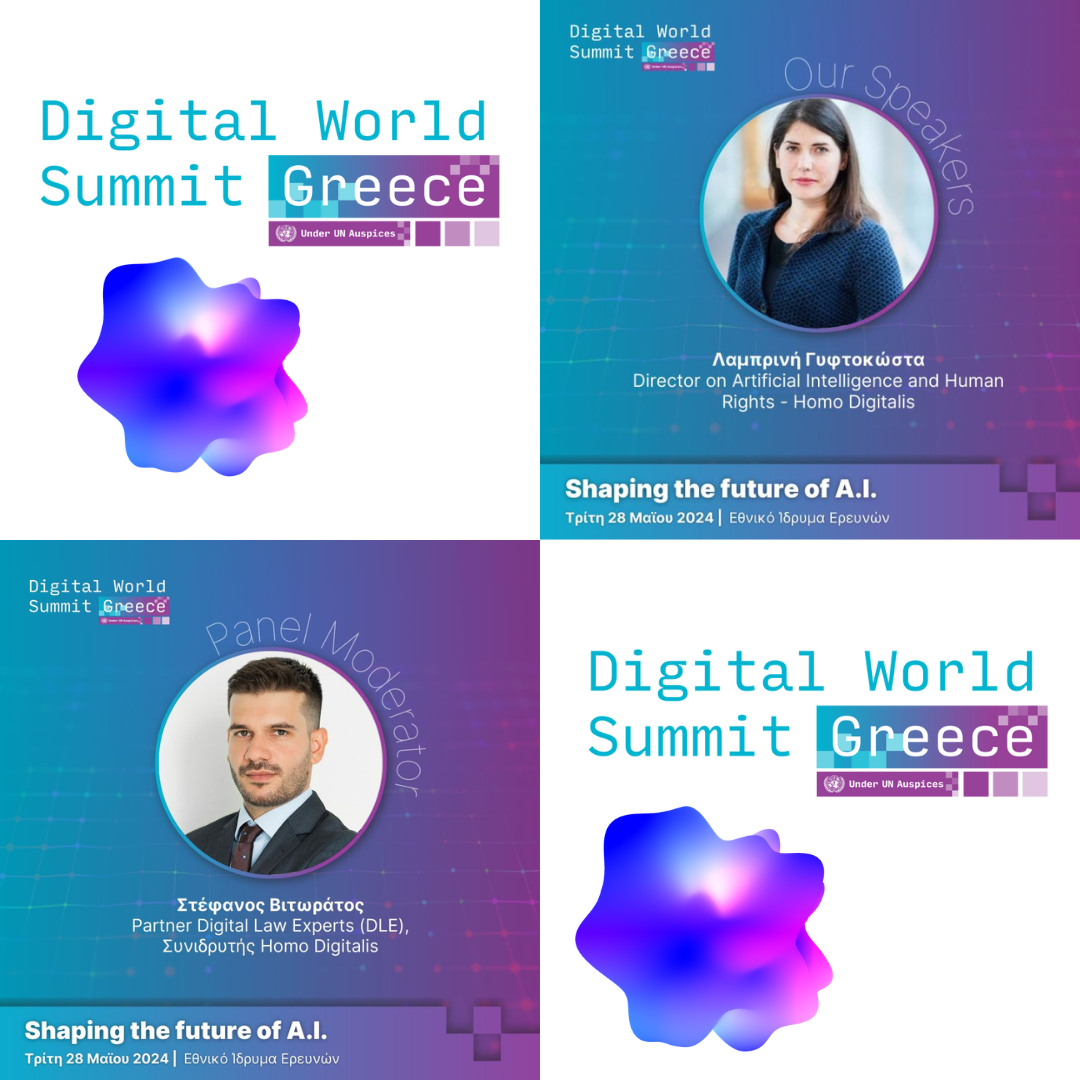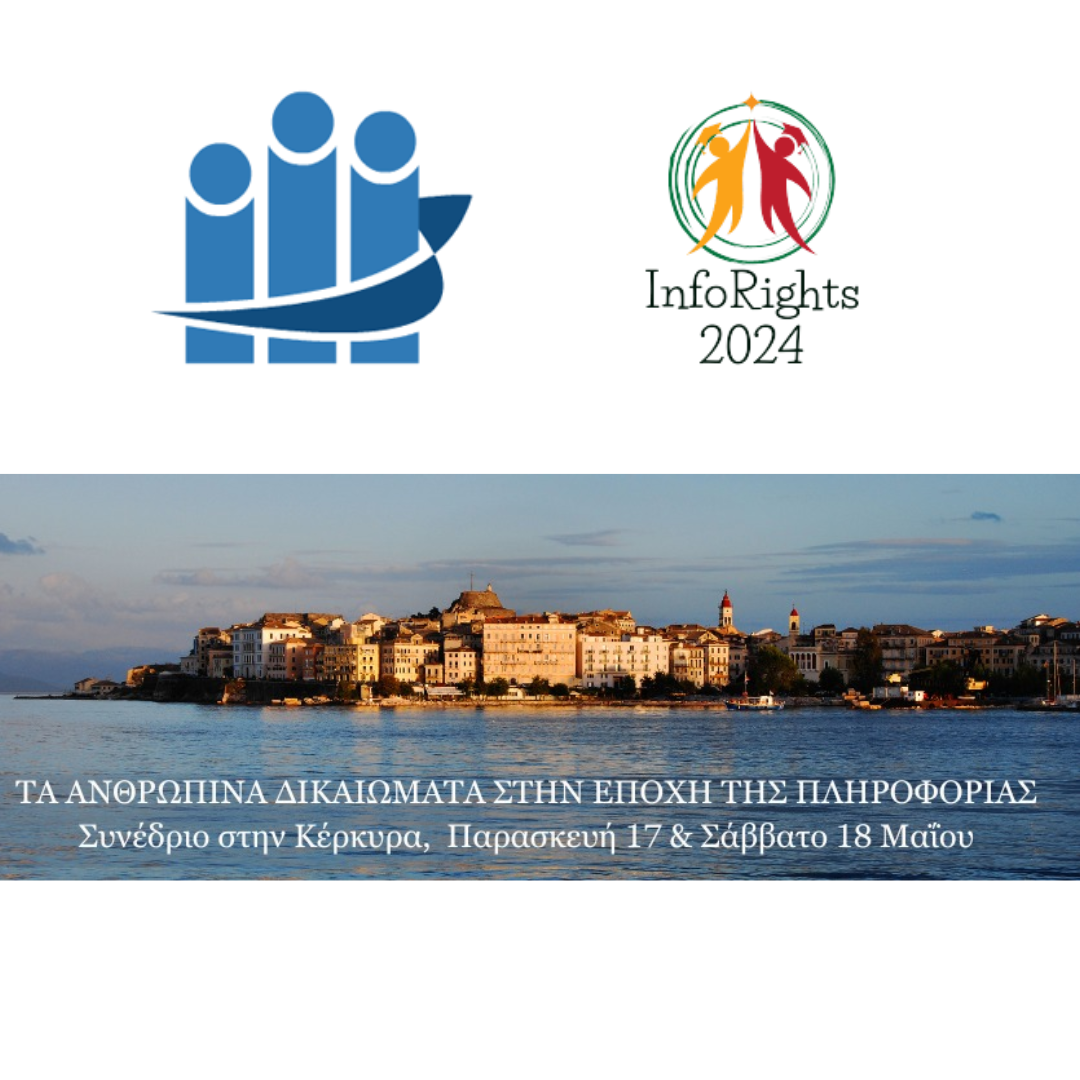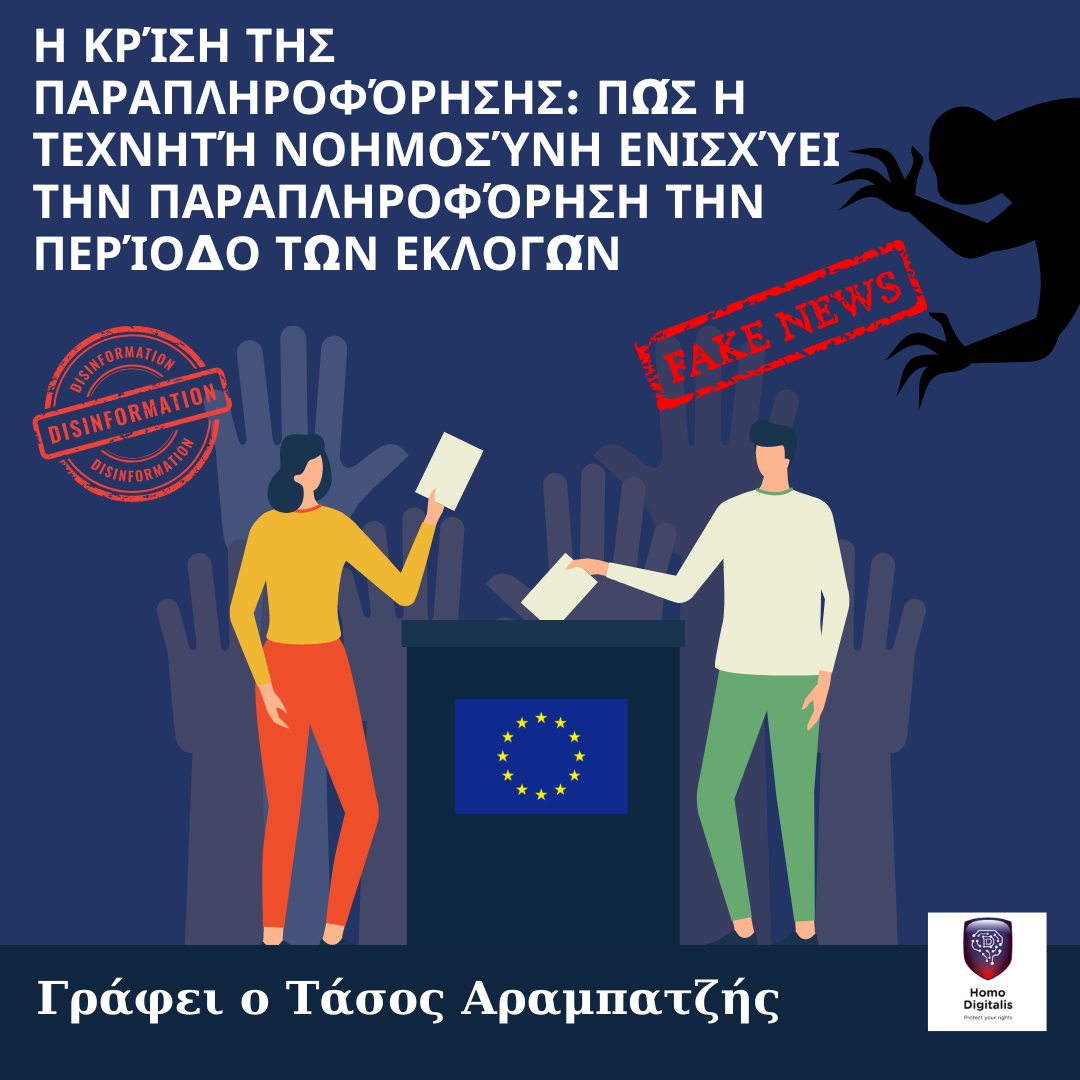New Book: #FakeYou – Don’t blame the people; don’t blame the Internet. Blame the power
Our friends from the digital rights civil society organization Xnet published recently the book “#FakeYou – Don’t blame the people; don’t blame the Internet. Blame the power”.
The book’s lead author is Simona Levi, while it is the activist’s guide to defeating fake news and blocking policies that use disinformation to curtail civil rights and freedoms.
You can freely read and download the book here.
We spoke at an event hosted by KEPSIPI in the context of the Erasmus+ Digital Learning and Social Intervention programme
On Thursday 23rd of May we had the pleasure to participate in the event organized by KEPSIPI in the framework of the Erasmus+ Digital Learning and Social Intervention project and to talk about digital learning and the importance of personal data for social workers from Greece, Belgium, France, Luxembourg and Romania and the challenges of using AI tools in the field of social intervention. We would like to thank Ms. Margarita Moraitou for the invitation and her efforts to highlight this issue both nationally and European-wide.
Our Director for AI and New Technologies, Lamprini Gyftokosta, spoke representing Homo Digitalis at the event.
You can learn more about the work and activities of the Centre for Mental and Pedagogical Health here.
Homo Digitalis' participation in the Digital World Summit Greece was a great success
Homo Digitalis had the great honor and pleasure to be present with double representation at the Digital World Summit Greece, today Tuesday, May 28th at the National Hellenic Research Foundation!
Specifically, our Vice President and Partner at Digital Law Experts (DLE), Stefanos Vitoratos, participated as a moderator in the 1st panel of the conference, on the topic “#AI: The intersection between regulation and innovation”, in a fascinating discussion with speakers such as Dimitris Gerogiannis (President AI Catalyst), Lilian Mitrou (Professor, Department of Information & Communication Systems Engineering, University of the Aegean), Charalambos Tsekeris (President of the National Bioethics & Technology Ethics Committee), Yannis Mastrogeorgiou (Special Secretary for Long Term Planning, Presidency of the Greek Government) and Fotis Draganidis (Director of Technology at Microsoft Hellas).
Our Director for Human Rights & Artificial Intelligence, Lamprini Gyftokosta, was a speaker at the 2nd panel of the Digital World Summit Greece 2024, on “Cybersecurity, Citizen Security and Artificial Intelligence”! The panel was moderated by Konstantinos Anagnostopoulos (Co-founder & Director, Athens Legal Tech), while Natalia Soulia (Senior Associate | Privacy, Data Protection & Cybersecurity, KG Law FIrm) was also present as a speaker, Thomas Dobridis (Head of the General Directorate of Cybersecurity, Ministry of Digital Governance), Antonis Broumas (Head of Law and Technology, EY Platis-Anastasiades) and Stella Tsitsoula (Founder, RED. comm, Co-Founder | Women4Cyber GR | Founder Hellenic Cybersecurity Institute)!
We would like to thank the organizers for their kind invitation, as every year, to this important conference.
We successfully presented our actions at InfoRights 2024 in Corfu
Homo Digitalis has the great pleasure to participate in the Third Interdisciplinary Conference Info Rights , organized by the Reading Society of Corfu on 17 & 18 May 2024 entitled “Human Rights in the Information Age: Benchmarks of History, Law, Ethics and Culture”.
Specifically, on Saturday 18 May, our member Christos Zanganas represented Homo Digitalis presenting our important actions in the field of Digital Rights in our three pillars of interest, Awareness, Advocacy and Strategic Legal Actions!
We would like to thank the organizers for the kind invitation!
Homo Digitalis with double representation at Digital World Summit Greece
Homo Digitalis has the great honor and pleasure to participate with double representation at the Digital World Summit Greece, on Tuesday 28 May at the National Hellenic Research Foundation!
Specifically, our Vice President and Partner at Digital Law Experts (DLE), Stefanos Vitoratos, will participate as a moderator in the 1st panel of the conference, on the topic “AI: The intersection between regulation and innovation”, in a fascinating panel discussion featuring Dimitris Gerogiannis (President AI Catalyst), Lillian Mitrou (Professor, Department of Information & Communication Systems Engineering, University of the Aegean), Charalambos Tsekeris (President of the National Bioethics & Technology Ethics Committee), Yannis Mastrogeorgiou (Special Secretary of Long Term Planning, Presidency of the Greek Government) and Fotis Draganidis (Director of Technology at Microsoft Hellas).
Our Director for Human Rights & Artificial Intelligence, Lambrini Gyftokosta, will participate as a speaker in the 2nd panel of the Digital World Summit Greece 2024, on the topic “Cybersecurity, Citizen Security and Artificial Intelligence”! This very interesting panel will be moderated by Konstantinos Anagnostopoulos (Co-founder & Director, Athens Legal Tech), while Natalia Soulia (Senior Associate | Privacy, Data Protection & Cybersecurity, KG Law FIrm), Thomas Dombridis (Head of the General Directorate of Cybersecurity of the Ministry of Digital Governance), Antonis Broumas (Head of the Law Department of the Ministry of Digital Governance), Antonis Broumas (Head of the Law Department of the Ministry of Digital Governance), and the Head of the Law Department of the Ministry of Justice of the Republic of Greece) will also be present as speakers.
You can register and read more about the conference and its programme here.
We participate in InfoRights 2024 in Corfu
Homo Digitalis has the great pleasure to participate in the Third Interdisciplinary Conference, organized by the Corfu Reading Society on 17 & 18 May 2024 entitled “Human Rights in the Information Age: Benchmarks of History, Law, Ethics and Culture”.
Our member Christos Zanganas will represent Homo Digitalis at the Conference, and on Saturday 18 at 12:00 he will present Homo Digitalis’ work for the protection of human rights in relation to the information society in Greece!
We would like to thank the organizers for the very honorable invitation!
You can register for free to attend the conference in person or read more about it here.
The focus of the interdisciplinary themes of the conference is human rights in relation to information in terms of history, regulation (law and ethics) and culture. It is co-organised by the Cultural and Historical Heritage Documentation Laboratory of TABM, the IHRC Research Group of TABM, and the Ionian University Library and Information Centre with the collaboration of the UNESCO Chair on Threats to Cultural Heritage and Heritage-related Activities of the Ionian University, as well as the Corfu Bar Association and the Ionian University Museum Collections.
We bring the "Misinformation" and "What The Future Wants" editions of the international exhibition "The Glass Room" to ADAF 2024!
The “Misinformation” and “What The Future Wants” editions of Tactical Tech’s international exhibition “The Glass Room” will be at the Athens Digital Arts Festival 2024 (ADAF2024)!!
In collaboration with Tactical Tech, the exhibition is brought to Greece by Homo Digitalis, Digital Detox Experience and Open Lab Athens, with the Homo Digitalis team and specifically our members Sophia Antonopoulou, Ariana Rapti and Alkmini Gianni, organising the two exhibitions for ADAF 2024!
ADAF 2024 will take place from 16 to 26 May at the Former Santarosa Courts (48 Stadiou & Arsaki). “The Glass Room: Misinformation Edition” will be available to the audience throughout the festival, while “The Glass Room: What the Future Wants Edition” will be presented in the form of a workshop on Saturday 18/5 at 14.00 by our members Sophia Antonopoulou, Ariana Rapti and Alkmini Gianni.
You can buy tickets for ADAF 2024 and read the full festival programme here.
Many thanks to our three members for their time, energy and dedication in organizing these exhibitions, as well as to ADAF for hosting us!
The Glass Room exhibition has travelled to 61 countries around the world, counting 471 award-winning events and more than 350,000 visitors worldwide. In the past, Homo Digitalis, Digital Detox Experience and Open Lab Athens have presented the exhibitions at the National Library of Greece in Athens and at JOIST Innovation Park in Larissa.
We participated in a survey of experts on the use of new technologies in the field of education in the framework of the MILES project
In the age of hyper-connectivity, people are inundated by a constant flow of information and news that brings, on the one hand, better and stable information about world events and, on the other hand, many risks associated with fake news and misinformation.
Homo Digitalis had the pleasure to participate in a relevant research-discussion conducted by the MILES project (MIL and PRE-BUNKING approaches for Critical thinking in the education sector) and addressed to experts regarding the use of new technologies in the field of education.
The aim of the debate is to gather information on misinformation in order to develop effective strategies for the education sector. The discussion focused on issues such as digital literacy, the cultivation of critical thinking as a tool for identifying fake news, the role of education and the education system, and exploring possible policy interventions.
Homo Digitalis was represented in the research debate by the Director of Human Rights & Artificial Intelligence, Lambrini Yftokosta. We would like to thank the civil society organization KMOP Social Action and Innovation Centre for the inclusion and the honorary invitation.
The Looming Disinformation Crisis: How AI is Weaponizing Misinformation in the Age of Elections
By Anastasios Arampatzis
Misinformation is as old as politics itself. From forged pamphlets to biased newspapers, those seeking power have always manipulated information. Today, a technological revolution threatens to take disinformation to unprecedented levels. Generative AI tools, capable of producing deceptive text, images, and videos, give those who seek to mislead an unprecedented arsenal. In 2024, as a record number of nations hold elections, including the EU Parliamentary elections in June, the very foundations of our democracies tremble as deepfakes and tailored propaganda threaten to drown out truth.
Misinformation in the Digital Age
In the era of endless scrolling and instant updates, misinformation spreads like wildfire on social media. It’s not just about intentionally fabricated lies; it’s the half-truths, rumors, and misleading content that gain momentum, shaping our perceptions and sometimes leading to real-world consequences.
Think of misinformation as a distorted funhouse mirror. Misinformation is false or misleading information presented as fact, regardless of whether there’s an intent to deceive. It can be a catchy meme with a dubious source, a misquoted scientific finding, or a cleverly edited video that feeds a specific narrative. Unlike disinformation, which is a deliberate spread of falsehoods, misinformation can creep into our news feeds even when shared with good intentions.
How the Algorithms Push the Problem
Social media platforms are driven by algorithms designed to keep us engaged. They prioritize content that triggers strong emotions – outrage, fear, or click-bait-worthy sensationalism. Unfortunately, the truth is often less exciting than emotionally charged misinformation. These algorithms don’t discriminate based on accuracy; they fuel virality. With every thoughtless share or angry comment, we further amplify misleading content.
The Psychology of Persuasion
It’s easy to blame technology, but the truth is we humans are wired in ways that make us susceptible to misinformation. Here’s why:
- Confirmation Bias: We tend to favor information that confirms what we already believe, even if it’s flimsy. If something aligns with our worldview, we’re less likely to question its validity.
- Lack of Critical Thinking: In a fast-paced digital world, many of us lack the time or skills to fact-check every claim we encounter. Pausing to assess the credibility of a source or the logic of an argument is not always our default setting.
How Generative AI Changes the Game
Generative AI models learn from massive datasets, enabling them to produce content indistinguishable from human-created work. Here’s how this technology complicates the misinformation landscape:
- Deepfakes: AI-generated videos can convincingly place people in situations they never were or make them say things they never did. This makes it easier to manufacture compromising or inflammatory “evidence” to manipulate public opinion.
- Synthetic Text: AI tools can churn out large amounts of misleading text, like fake news articles or social media posts designed to sound authentic. This can overwhelm fact-checking efforts.
- Cheap and Easy Misinformation: The barrier to creating convincing misinformation keeps getting lower. Bad actors don’t need sophisticated technical skills; simple AI tools can amplify their efforts.
The Dangers of Misinformation
The impact of misinformation goes well beyond hurt feelings. It can:
- Pollute Public Discourse: Misinformation hinders informed debate. It leads to misunderstandings about important issues and makes finding consensus difficult.
- Erode Trust: When we can’t agree on basic facts, trust in institutions, science, and even the democratic process breaks down.
- Targeted Manipulation: AI tools can allow for highly personalized misinformation campaigns that prey on specific vulnerabilities or biases of individuals and groups.
- Influence Decisions: Misinformation can influence personal decisions, including voting for less qualified candidates or promoting radical agendas.
What Can Be Done?
There is no single, easy answer for combating the spread of misinformation. Disinformation thrives in a complicated web of human psychology, technological loopholes, and political agendas. However, recognizing these challenges is the first step toward building effective solutions. Here are some crucial areas to focus on:
- Boosting Tech Literacy: In a digital world, the ability to distinguish reliable sources from questionable ones is paramount. Educational campaigns, workshops, and accessible online resources should aim to teach the public how to spot red flags for fake news: sensational headlines, unverified sources, poorly constructed websites, or emotionally charged language.
- Investing in Fact-Checking: Supporting independent fact-checking organizations is key. These act as vital watchdogs, scrutinizing news, politicians’ claims, and viral content. Media outlets should consider prominently labeling content that has been verified or clearly marking potentially misleading information.
- Balancing Responsibility & Freedom: Social media companies and search engines bear significant responsibility for curbing the flow of misinformation. The EU’s Digital Services Act (DSA) underscores this responsibility, placing requirements on platforms to tackle harmful content. However, this is a delicate area, as heavy-handed censorship can undermine free speech. Strategies such as demoting unreliable sources, partnering with fact-checkers, and providing context about suspicious content can help, but finding the right balance is an ongoing struggle, even in the context of evolving regulations like the DSA.
- The Importance of Personal Accountability: Even with institutional changes, individuals play a vital role. It’s essential to be skeptical, ask questions about where information originates, and be mindful of the emotional reactions a piece of content stirs up. Before sharing anything, verify it with a reliable source. Pausing and thinking critically can break the cycle of disinformation.
The fight against misinformation is a marathon, not a sprint. As technology evolves, so too must our strategies. We must remain vigilant to protect free speech while safeguarding the truth.

